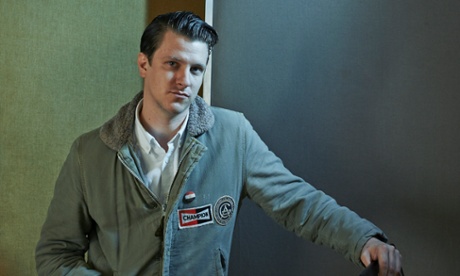
There is a theory that trends in rock and pop music move at a much less dramatic pace than they once did. You used to get great upheavals that suddenly left the world before them looking dated: psychedelia, punk, acid house. Now we’re supposed to live in a less turbulent musical era, where the whole smorgasbord of the past is available online, ready for anyone to draw on, where nothing seems arcane and nothing really goes out of fashion.
If you wanted to disprove the theory, you could head to YouTube and look up the kind of artists that provided the lifeblood of the NME during the mid-to-late noughties. This was an age when what you might tortuously call mainstream alt-rock seemed to exist in the shadows of varying length cast by the Libertines and the Streets: there was a vague suggestion of the influence of grime MCs and a distinct whiff of have-a-banana-era Blur. There they all are: the MySpace-promoted singer-songwriters, the bands big on choppy, ska-influenced guitars and the kind of gorblimey accents you suspect only an expensive education can buy. It’s only six or seven years since they were on Radio 1, and yet it all seems like a transmission from a bygone era.
It’s easy to view Jamie Treays as very much a product of that time: his records involved ska-punk guitars, an MC-inspired delivery and a vocal style suggestive of a youth spent struggling to survive on London’s meanest streets rather than, say, at the same boarding school as Tim Henman and Prince Zeid bin Ra’ad of Jordan. The latter was a bit ridiculous – for all the relevance Treays’s voice had to his background, he might as well have come onstage in a beret, with a string of onions round his neck, going “Hon-he-hon, I am – ’ow you say? – ze Frenchman” – but then, what is pop music if not a theatre of dreams in which you can reinvent yourself however you chose? But while most of that era’s musical practitioners have long since disappeared, Treays has not – although he temporarily gave the appearance of having done so. Five years separate the release of his third album from that of its predecessor, Kings and Queens: hardly an eternity, but long enough for certain areas of the internet to start carrying on as if the singer was a mysterious Syd Barrett-esque hermit.
It certainly wasn’t public indifference that prompted his sabbatical. Kings and Queens went to No 2, amid glowing reviews that suggested Treays’s talent was audibly more substantial than most of his peers’. It’s tempting to think that the interim period might have been spent rethinking his approach to suit changing times. There are certainly moments here that reveal Treays’s roots, or at least his musical ones: closer They Told Me It Rained repeatedly invokes Madness’s “heavy, heavy monster sound”, albeit in a song that sounds absolutely nothing like Madness; Rabbit Hole and Zombie are decent enough songs, but their rickety punk could have turned up on Zane Lowe between something by the Holloways and Jack Peñate. Elsewhere, there’s evidence of a growing maturity, befitting a man nearing 30. For a mercy, the you-get-me-blud? routine has been toned down a bit, which helps concentrate attention on the actual songwriting. If he can’t quite carry off the fingerpicking folk ballad style of Love Is Only a Heartbeat Away – it all sounds a bit self-conscious – there’s a real melodic richness about Mary Lee and opener Limits Lie, the latter piling layer after layer of effected guitar over a desperate, yearning two-note vocal hook. On Don’t You Find, he opts for one of those massed “woah-oh” choruses that currently appear to be some kind of legal requirement, but twists it until it actually expresses something other than a desire to sound like everyone else: partially buried beneath unsteady surges of strings and distorted vocals, sung by a ramshackle collection of voices, it feels strangely uncertain and anxious, which fits the tone of the song.
As a lyricist, Treays is very good on the weirdness and uncertainty of your late 20s: the shifts in friendships, the galling moment when you realise you’re an adult, whether or not you feel like one. There’s something really affecting and realistic about the way Carry on the Grudge lurches from expansive thoughtfulness to the adolescent he-nicked-my-bird mewling of Peter. He’s less successful as an observer of life on London’s social margins. The Prophet aims for the kind of reportage of the capital’s outcasts that Shane MacGowan once excelled at, but while MacGowan’s songs had the nasty taste of authenticity about them, Treays lays it on a bit thick in the quest to be unflinchingly vivid and ends up sounding cartoonish: “Jackie her whisky buddy hits him with an iron fist, the landlord goes down swinging while you drink your buddy’s piss”.
At moments like this, Carry on the Grudge exposes the limits of what Treays can do. But there are other moments, and more of them, where it suggests that behind the affectations lurks something quite prosaic but quite potent: at his best, he’s a really good songwriter. You could say that sounds like rather unspectacular praise, but it isn’t: for all Carry on the Grudge’s flaws, you can see why he’s still here when most of his late noughties peers aren’t.

